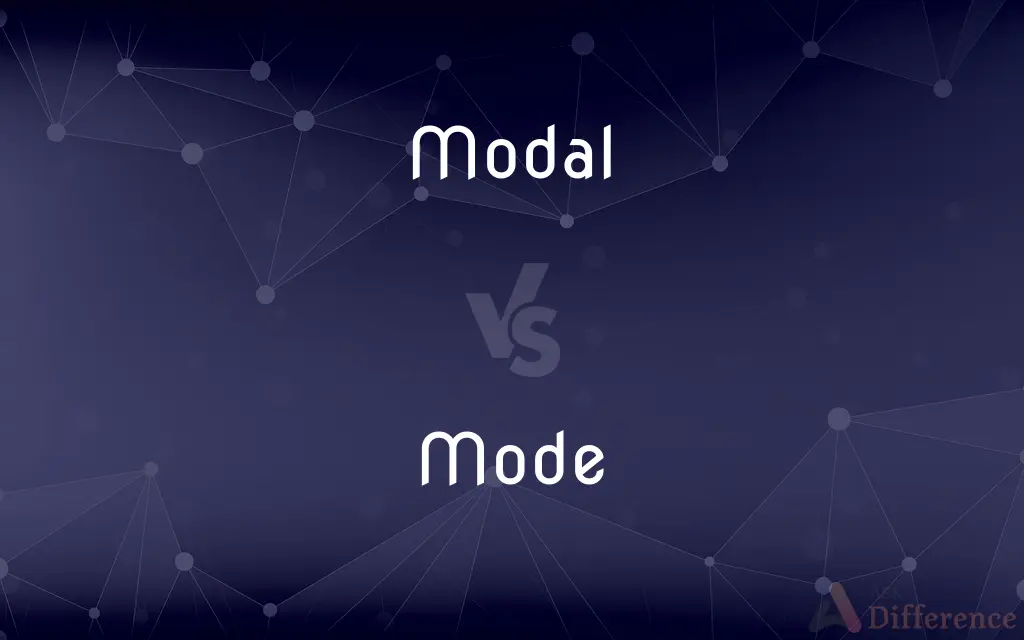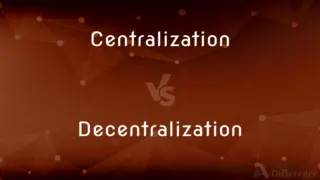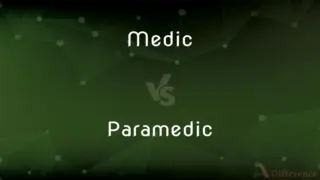Modal vs. Mode — What's the Difference?
By Urooj Arif & Fiza Rafique — Updated on March 29, 2024
Modal often refers to a grammatical mood indicating a condition, while mode denotes a manner of operation or a specific condition.

Difference Between Modal and Mode
Table of Contents
ADVERTISEMENT
Key Differences
Modal is primarily used in linguistics to describe a grammatical mood that expresses modality, indicating possibility, necessity, or contingency. This grammatical aspect affects the verb to show how the action or state is conceived by the speaker. For example, in the sentence "She can swim," "can" is a modal verb showing ability. Mode, on the other hand, refers to a manner, way, or method of doing something or the state of something. It is used across various contexts, from statistics, where it represents the most frequently occurring value in a dataset, to technology, describing different operating states, such as "airplane mode" on a mobile phone.
Modal verbs do not change to show past tense or by adding "-s" in the third person singular form, unlike regular verbs. For example, "She can swim" remains unchanged for past tense or third-person singular perspective, while "mode" can be adjusted according to tense and number, such as "modes" for plural.
In the context of music, modal refers to scales that are derived from the ancient Greek modes, which are used to create melody and harmony based on a pattern of whole and half steps. Mode in music can refer to different scales or keys that a piece of music is composed in, affecting its overall mood and feel.
While modal is closely tied to linguistics and sometimes music, mode spans a wider array of disciplines, including mathematics, where it denotes the most common value in a set of data, technology, describing operational settings, and even fashion, referring to current trends or styles.
Comparison Chart
Definition
Refers to grammatical mood expressing possibility, etc.
Refers to a manner of operation or a specific condition.
ADVERTISEMENT
Use in Sentences
"She might go." (Indicating possibility)
"Portrait mode on a camera." (Describing a feature)
Linguistic Change
No change for tense or person
Can change according to tense and number
Context of Use
Grammar, occasionally in music
Wide-ranging: technology, statistics, music, fashion
Examples in Music
Scales based on ancient Greek modes
Different scales or keys in compositions
Compare with Definitions
Modal
Linguistic Modality.
Modal expressions in English include modal verbs, adverbs, and adjectives.
Mode
Manner of Operating.
Switching the device into silent mode.
Modal
Grammatical Mood.
In the sentence 'You must leave,' 'must' is a modal verb expressing necessity.
Mode
Specific Condition.
The software runs in an optimized mode for better performance.
Modal
Expressing Possibility or Necessity.
Modal verbs like 'can' and 'may' introduce a layer of possibility into the sentence.
Mode
Statistics (Most Frequent Value).
In this dataset, the mode is 23.
Modal
Music.
Modal jazz focuses on improvisation through scales rather than chord progressions.
Mode
Music (Scale or Key).
The piece shifts from a major to a minor mode.
Modal
Related to Modality.
The study focuses on the modal aspects of ancient texts.
Mode
Fashion Trends.
Vintage mode is back in fashion this season.
Modal
Of, relating to, or characteristic of a mode.
Mode
A manner, way, or method of doing something, experiencing something, or acting
Modern modes of travel.
Modes of consciousness.
Modes of affection.
Modal
(Grammar) Of, relating to, or expressing the mood of a verb.
Mode
A particular form or kind
The building has multiple modes of egress.
Modal
(Music) Of, relating to, characteristic of, or composed in any of the modes typical of medieval church music.
Mode
A given condition of functioning; a status or operation
The spacecraft was in its recovery mode.
Modal
(Philosophy) Of or relating to mode without referring to substance.
Mode
The current or customary fashion or style
A hat in the latest mode.
Modal
(Logic) Expressing or characterized by modality.
Mode
Any of certain fixed arrangements of the diatonic tones of an octave, as the major and minor scales of Western music.
Modal
(Statistics) Of or relating to a statistical mode or modes.
Mode
A patterned arrangement, as the one characteristic of the music of classical Greece or the medieval Christian Church.
Modal
See modal auxiliary.
Mode
(Philosophy) The particular appearance, form, or manner in which an underlying substance, or a permanent aspect or attribute of it, is manifested.
Modal
Of, or relating to a mode or modus.
Mode
See modality.
Modal
(grammar) Of, relating to, or describing the mood of a clause.
Mode
The arrangement or order of the propositions in a syllogism according to both quality and quantity.
Modal
(music) Of, relating to, or composed in the musical modi by which an octave is divided, associated with emotional moods in Ancient — and in medieval ecclesiastical — music.
Mode
(Statistics) The value or item occurring most frequently in a series of observations or statistical data.
Modal
(logic) Of, or relating to the modality between propositions.
Mode
(Mathematics) The number or range of numbers in a set that occurs the most frequently.
Modal
(statistics) Relating to the statistical mode.
Mode
(Geology) The mineral composition of an igneous rock expressed in terms of percentage of the total sample weight or volume.
Modal
(computing) Having separate modes in which user input has different effects.
Mode
(Physics) Any of numerous patterns of wave motion or vibration.
Modal
(GUI) Requiring immediate user interaction and thus presented so that it cannot be closed or interacted behind until a decision is made.
A modal dialog; a modal window
Mode
(Grammar) Mood.
Modal
(metaphysics) Relating to the form of a thing rather to any of its attributes.
Mode
(music) One of several ancient Greek scales.
Modal
(logic) A modal proposition.
Mode
(music) One of several common scales in modern Western music, one of which corresponds to the modern major scale and one to the natural minor scale.
Modal
(linguistics) A modal form, notably a modal auxiliary.
Mode
A particular means of accomplishing something.
What was the mode of entry?
Modal
(grammar) A modal verb.
Mode
A particular state of being, or frame of mind.
After a series of early setbacks, her political campaign is in crisis mode.
Modal
(GUI) A modal window, one that cannot be closed until a decision is made.
Mode
(statistics) The most frequently occurring value in a distribution
Modal
Of or pertaining to a mode or mood; consisting in mode or form only; relating to form; having the form without the essence or reality.
Mode
A state of a system that is represented by an eigenfunction of that system.
Modal
Indicating, or pertaining to, some mode of conceiving existence, or of expressing thought, such as the modes of possibility or obligation.
Mode
(computing) One of various related sets of rules for processing data; more generally, any state of the system associated with certain behaviours.
In insert mode, characters typed are directly inserted into the buffer.
Modal
Pertaining to or denoting mood.
Mode
(electronics) A series of settings on a device used for a specific purpose.
Airplane mode; night mode
Modal
A modal auxiliary.
Mode
(video games) A variation in gameplay, such as a difficulty level.
Modal
Relating to or constituting the most frequent value in a distribution;
The modal age at which American novelists reach their peak is 30
Mode
(grammar) A verb form that depends on how its containing clause relates to the speaker’s or writer’s wish, intent, or assertion about reality.
Modal
Of or relating to a musical mode; especially written in an ecclesiastical mode
Mode
(philosophy) That which exists only as a quality of substance.
Modal
Relating to or expressing the mood of a verb;
Modal auxiliary
Mode
(textiles) In lace-making, a small decorative piece inserted into a pattern.
Mode
(textiles) The openwork between the solid parts of a pattern.
Mode
(obsolete) A woman's mantle with a hood.
Mode
Style or fashion; popular trend.
Her wardrobe is always in mode.
Mode
Manner of doing or being; method; form; fashion; custom; way; style; as, the mode of speaking; the mode of dressing.
The duty of itself being resolved on, the mode of doing it may easily be found.
A table richly spread in regal mode.
Mode
Prevailing popular custom; fashion, especially in the phrase the mode.
The easy, apathetic graces of a man of the mode.
Mode
Variety; gradation; degree.
Mode
Any combination of qualities or relations, considered apart from the substance to which they belong, and treated as entities; more generally, condition, or state of being; manner or form of arrangement or manifestation; form, as opposed to matter.
Modes I call such complex ideas, which, however compounded, contain not in them the supposition of subsisting by themselves, but are considered as dependencies on, or affections of, substances.
Mode
The form in which the proposition connects the predicate and subject, whether by simple, contingent, or necessary assertion; the form of the syllogism, as determined by the quantity and quality of the constituent proposition; mood.
Mode
Same as Mood.
Mode
The scale as affected by the various positions in it of the minor intervals; as, the Dorian mode, the Ionic mode, etc., of ancient Greek music.
Mode
The value of the variable in a frequency distribution or probability distribution, at which the probability or frequency has a maximum. The maximum may be local or global. Distributions with only one such maximum are called unimodal; with two maxima, bimodal, and with more than two, multimodal.
Mode
How something is done or how it happens;
Her dignified manner
His rapid manner of talking
Their nomadic mode of existence
In the characteristic New York style
A lonely way of life
In an abrasive fashion
Mode
A particular functioning condition or arrangement;
Switched from keyboard to voice mode
Mode
A classification of propositions on the basis of whether they claim necessity or possibility or impossibility
Mode
Verb inflections that express how the action or state is conceived by the speaker
Mode
Any of various fixed orders of the various diatonic notes within an octave
Mode
The most frequent value of a random variable
Common Curiosities
How is mode used in statistics?
In statistics, the mode is the value that appears most frequently in a data set.
Is modal only related to language?
Primarily, yes, especially in terms of grammar, but it can also refer to modes in music.
What is a modal verb?
A modal verb is a type of verb that is used to indicate modality – that is, likelihood, ability, permission, and obligation.
Can mode refer to technology?
Yes, in technology, mode refers to different states or operations of a device or software, like "airplane mode."
Can mode be applied to fashion?
Yes, mode can describe current fashion trends or styles.
Can a musical piece change modes?
Yes, composers often change modes within a piece to evoke different emotions or themes.
What is the difference between mode in music and modal scales?
Mode in music refers to the key or scale of a piece, while modal scales are specific types of scales used in modal music compositions.
Are modal verbs irregular?
Modal verbs are considered irregular because they do not follow the standard conjugation patterns of regular verbs.
Is the mode always a single value in statistics?
Not always; a dataset can have more than one mode if multiple values occur with the same highest frequency.
What's the importance of mode in user interfaces?
Modes in user interfaces define how user inputs are interpreted, affecting the functionality available to the user.
How does mode function in mathematics?
Mode in mathematics identifies the most frequently occurring number in a set of numbers.
What does 'airplane mode' signify?
Airplane mode is a setting on mobile devices that suspends radio-frequency signal transmission, allowing use of certain functions on a plane.
How does mode affect a photograph?
The mode, like portrait or landscape, affects the focus, depth of field, and composition of the photograph.
How does understanding modals improve language skills?
Learning modals enhances one's ability to express possibilities, necessities, permissions, and obligations, enriching communication.
Do all languages use modal verbs?
Many languages use modal verbs or other means to express modality, but the specific verbs and expressions vary.
Share Your Discovery

Previous Comparison
Centralization vs. Decentralization
Next Comparison
Medic vs. ParamedicAuthor Spotlight
Written by
Urooj ArifUrooj is a skilled content writer at Ask Difference, known for her exceptional ability to simplify complex topics into engaging and informative content. With a passion for research and a flair for clear, concise writing, she consistently delivers articles that resonate with our diverse audience.
Co-written by
Fiza RafiqueFiza Rafique is a skilled content writer at AskDifference.com, where she meticulously refines and enhances written pieces. Drawing from her vast editorial expertise, Fiza ensures clarity, accuracy, and precision in every article. Passionate about language, she continually seeks to elevate the quality of content for readers worldwide.














































